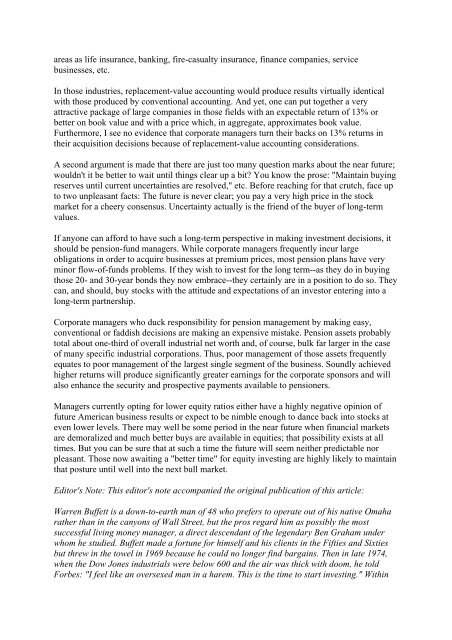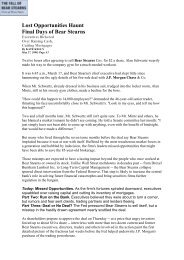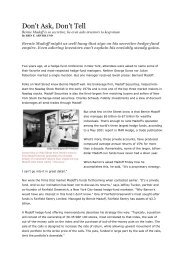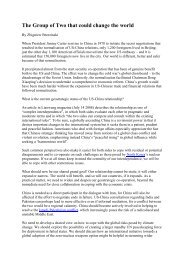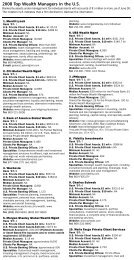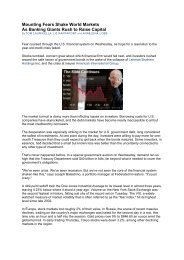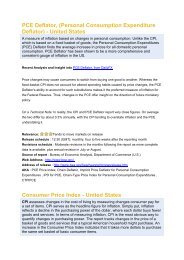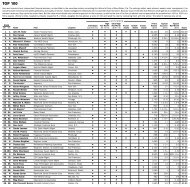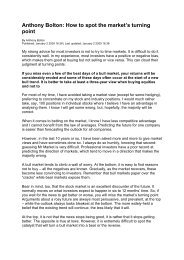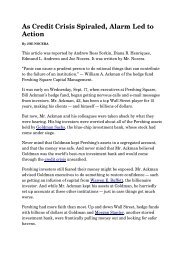You Pay A Very High Price In The Stock Market For A ... - Morningbull
You Pay A Very High Price In The Stock Market For A ... - Morningbull
You Pay A Very High Price In The Stock Market For A ... - Morningbull
You also want an ePaper? Increase the reach of your titles
YUMPU automatically turns print PDFs into web optimized ePapers that Google loves.
areas as life insurance, banking, fire-casualty insurance, finance companies, service<br />
businesses, etc.<br />
<strong>In</strong> those industries, replacement-value accounting would produce results virtually identical<br />
with those produced by conventional accounting. And yet, one can put together a very<br />
attractive package of large companies in those fields with an expectable return of 13% or<br />
better on book value and with a price which, in aggregate, approximates book value.<br />
Furthermore, I see no evidence that corporate managers turn their backs on 13% returns in<br />
their acquisition decisions because of replacement-value accounting considerations.<br />
A second argument is made that there are just too many question marks about the near future;<br />
wouldn't it be better to wait until things clear up a bit? <strong>You</strong> know the prose: "Maintain buying<br />
reserves until current uncertainties are resolved," etc. Before reaching for that crutch, face up<br />
to two unpleasant facts: <strong>The</strong> future is never clear; you pay a very high price in the stock<br />
market for a cheery consensus. Uncertainty actually is the friend of the buyer of long-term<br />
values.<br />
If anyone can afford to have such a long-term perspective in making investment decisions, it<br />
should be pension-fund managers. While corporate managers frequently incur large<br />
obligations in order to acquire businesses at premium prices, most pension plans have very<br />
minor flow-of-funds problems. If they wish to invest for the long term--as they do in buying<br />
those 20- and 30-year bonds they now embrace--they certainly are in a position to do so. <strong>The</strong>y<br />
can, and should, buy stocks with the attitude and expectations of an investor entering into a<br />
long-term partnership.<br />
Corporate managers who duck responsibility for pension management by making easy,<br />
conventional or faddish decisions are making an expensive mistake. Pension assets probably<br />
total about one-third of overall industrial net worth and, of course, bulk far larger in the case<br />
of many specific industrial corporations. Thus, poor management of those assets frequently<br />
equates to poor management of the largest single segment of the business. Soundly achieved<br />
higher returns will produce significantly greater earnings for the corporate sponsors and will<br />
also enhance the security and prospective payments available to pensioners.<br />
Managers currently opting for lower equity ratios either have a highly negative opinion of<br />
future American business results or expect to be nimble enough to dance back into stocks at<br />
even lower levels. <strong>The</strong>re may well be some period in the near future when financial markets<br />
are demoralized and much better buys are available in equities; that possibility exists at all<br />
times. But you can be sure that at such a time the future will seem neither predictable nor<br />
pleasant. Those now awaiting a "better time" for equity investing are highly likely to maintain<br />
that posture until well into the next bull market.<br />
Editor's Note: This editor's note accompanied the original publication of this article:<br />
Warren Buffett is a down-to-earth man of 48 who prefers to operate out of his native Omaha<br />
rather than in the canyons of Wall Street, but the pros regard him as possibly the most<br />
successful living money manager, a direct descendant of the legendary Ben Graham under<br />
whom he studied. Buffett made a fortune for himself and his clients in the Fifties and Sixties<br />
but threw in the towel in 1969 because he could no longer find bargains. <strong>The</strong>n in late 1974,<br />
when the Dow Jones industrials were below 600 and the air was thick with doom, he told<br />
<strong>For</strong>bes: "I feel like an oversexed man in a harem. This is the time to start investing." Within


